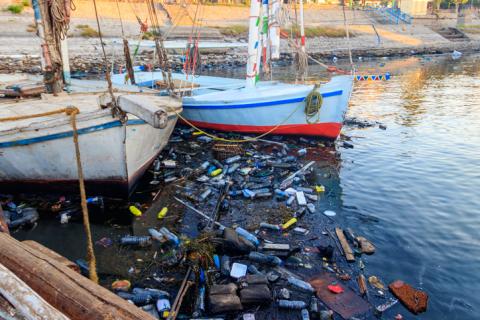US president Donald Trump flew into London this week, adding to his ever-burgeoning carbon footprint. If you remember, he elected to take the world’s biggest polluter out of the Paris Climate Agreement in 2017.
Without drastic changes both structurally and personally in our lives, a domino effect of uncontrollable climate disasters could be just around the corner. If we carry on our current trajectory we are set to exceed the point of no return, namely 2ºC of warming, by 2035. What happens then? Extinction? No more birds. No more bees. No more Love Island. No more islands full stop.
This is why students are protesting. This is the world we are going to inherit. We might not be able to go on holiday to the Maldives because it simply won't be there.
Faced with this enormous task, the anarchic response of taking as many short-haul flights as possible and gorging on red meat seems logical. Why not just enjoy the final episode in the series of the inhabitable planet Earth? Or perhaps you’re continuing to wilfully ignore our impending demise. Equally understandable.
Climate change has always been portrayed as abstract, slow moving and distant. It is in our nature to worry about things that feel tangible over things that don’t.
Yet, fuelled in part by David Attenborough’s Blue Planet II, awareness of plastic pollution has served as a gateway to a national environmental reawakening. A recent Greenpeace poll revealed that two-thirds of people in the UK recognise that there is a climate emergency. Some 76 per cent said that they would cast their vote differently to protect the planet. The momentum is there, and the consequences of inaction are unthinkable.
Top universities in the world for global impact
What’s more, activism led by students has already had a number of victories. Many of our universities have recently withdrawn their support for fossil fuels through divestment. Students at my university, University of Warwick, voted overwhelmingly last week to declare a climate emergency. A similar process is taking place on campuses across the country. New student societies such as “Waste-Free Warwick” will help to make universities a breeding ground for progressive climate ideas.
Students, likewise, played a key role in the Extinction Rebellion protests globally. At my Erasmus university, the Free University of Berlin, students took over the cafeteria at lunchtimes to garner support for the 24 May climate strikes. Crucially, through this activism, people who have never protested before got involved.
The UK parliament’s declaration of a climate emergency in response to the protests is also undeniably positive. It reiterates how effective student activism has been at highlighting the immediacy of the problem. This must, however, be followed by concrete action, and quickly. Jamaica, a country already affected hugely by plastic waste, banned single-use plastic this year.
As of 2015, Uruguay has produced 95 per cent of its electricity from renewable sources and is on track to be carbon-neutral by 2030. Swift change is both necessary and achievable.
However, over 70 per cent of global carbon emissions since 1988 can be traced to just 100 companies, which should serve as a stark reminder of how this is also an institutional problem.
But individuals must also bear responsibility if we are to avert a climate disaster. Flying less and eating less meat are two ways to take individual action, and we need to have a rational debate about how much we consume. If everyone on Earth consumed as much as the average US citizen, four Earths would be needed to sustain us all. Here I must admit my own hypocrisy as someone currently on their Erasmus year. Living on a student budget, I find it hard to turn down a journey home with Ryanair for a tenth of the price of the 12-hour train.
Nevertheless, a life with less consumption can be a happier one – it is not all about sacrifice.
Alongside activism, framing the climate crisis as an opportunity as much as a threat is an essential next step to changing attitudes. Research from the think tank Autonomy has underlined the need to harness automation and move to a four-day working week in order to avoid more than 2ºC of warming.
So if consuming less could theoretically involve working less, that’s definitely something the student lifestyle has prepared us for. We student visionaries have long been living a four-day working week, sometimes even less!
Read more: Top universities for climate action

Comments